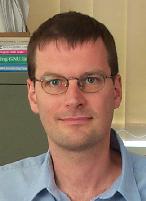
 |
Elisabeth André is a full professor of computer science at the University of Augsburg, Germany. Prior to that, she was working as a principal researcher at DFKI GmbH. She is the Chair of the ACL Special Interest Group on Multimedia Language Processing (SIGMEDIA). Furthermore, she is on the Editorial Board of Artificial Intelligence Communications (AICOM), Cognitive Processing (International Quarterly of Cognitive Science), Universal Access to the Information Society (UAIS), the Area Editor for Intelligent User Interfaces of the Electronic Transactions of Artificial Intelligence (ETAI), and a member of the editorial board of Computational Linguistics for the period of 2002-2004. Her research interests include: embodied conversational agents, operational models of personality and emotion, multimodal dialogue systems and multimedia authoring. |
 |
Michael Wooldridge is Professor of Computer Science in the Department of Computer Science at the University of Liverpool, UK. He has been active in the research and development of multi-agent systems for ten years, gaining his PhD for work in the theoretical foundations of multi-agent systems from the University of Manchester, UK in 1992. Prof Wooldridge has published over a hundred articles in the theory and practice of agent-based systems, has edited nine books in the area, and published a monograph entitled "Reasoning about Rational Agents" (MIT Press, 2000); his textbook "An Introduction to Multiagent Systems" (Wiley) was published in 2002. He has served on many program committees for conferences and workshops in the area, and is a director of the International Foundation for Multi-Agent Systems (IFMAS). He also serves as editor in chief of the International Journal of Autonomous Agents and Multi-Agent Systems (Kluwer), and an editorial board member for the Journal of Applied AI (Taylor & Francis). He is founder and associate coordinator of AgentLink, the ESPRIT-funded European Network of Excellence in the area ofagent-based computing (see http://www.AgentLink.org/). |
 |
Dieter Fensel is an associated professor at the Vrije Universiteit Amsterdam in the area of business informatics. After studying mathematics, sociology and computer science in Berlin, he joined in 1989 the Institute AIFB at the University of Karlsruhe. His major subject was knowledge engineering and his PhD thesis in 1993 was about a formal specification language for knowledge-based systems. From 1994 until 1996 he visited the group of Bob Wielinga at the SWI Department in Amsterdam. During this time his main interest were problem-solving methods of knowledge-based systems. In 1996, he come back as a senior researcher at the Institute AIFB finalizing his Habilitation in 1998. Currently, his foccus is on the use of Ontologies to mediate access to heterogeneous knowledge sources and to apply them in knowledge management and electronic commerce. |